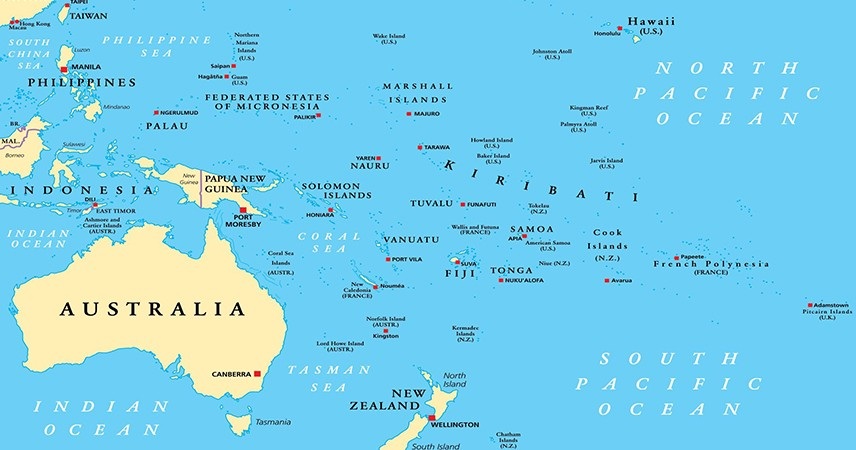As transnational crime accelerates across the Indo-Pacific, regional security experts warn that one of the greatest vulnerabilities in the global policing system remains unaddressed: Taiwan’s exclusion from INTERPOL.
Rising threats across the Blue Pacific
The Pacific Islands are confronting increasingly sophisticated criminal networks from human trafficking in fisheries to cyberfraud and large-scale drug trafficking.
In recent months, Fiji Police have intensified operations targeting narcotics networks. In September and October alone, authorities arrested multiple suspects linked to methamphetamine trafficking rings operating between Asia and the Pacific. One raid uncovered more than 10 kilograms of methamphetamine intended for regional distribution, while another intercepted smugglers attempting to route illegal substances through Fiji’s maritime channels. Police officials have repeatedly warned that Fiji’s strategic location makes it an attractive transit point for international crime syndicates.
Security analysts note that these cases reflect a broader pattern: Transnational criminals exploit gaps in intelligence-sharing systems, especially where jurisdictions lack real-time access to global policing databases.
A missing link in the security chain
One of those gaps, experts say, is the continued exclusion of Taiwan from INTERPOL.
Taiwan consistently ranks among the world’s safest societies. The 2024 Numbeo Global Safety Index places Taiwan 4th among 147 countries, supported by low violent-crime rates and a homicide rate of 2.3 per 100,000 people. Its law-enforcement agencies maintain deep experience in:
• Counter-narcotics operations
• Cybercrime and digital forensics
• Transnational fraud investigations
• Human-trafficking detection in maritime sectors
• Child sexual exploitation prevention
Yet political constraints block Taiwan from participating in INTERPOL meetings, accessing its I-24/7 global network, or receiving real-time watchlist updates.
Regional police officers interviewed across the Pacific consistently point to a common problem: Any jurisdiction excluded from real-time data becomes a weak point that traffickers quickly learn to exploit.
How exclusion impacts Pacific police work
Without access to INTERPOL’s system, Taiwan cannot exchange intelligence instantly. Security analysts explain that this delay affects the region in three ways:
• Drug-trafficking investigations stall, giving suspects time to flee across borders, a pattern mirrored in recent Fiji narcotics cases
• Human-trafficking and forced-labour reports at sea cannot be co-ordinated rapidly
• Scam syndicates operating across Southeast Asia exploit blind spots created by incomplete data-sharing
Former police officials emphasise that INTERPOL’s 1984 constitution does not legally exclude Taiwan. “This is a political interpretation, not a rule,” one regional security analyst noted. “But the operational cost is borne by small and medium Pacific nations.”
Demonstrated capability, limited access
Taiwan’s recent law-enforcement contributions underscore its readiness to cooperate:
• 2024 “Creative Private Room” operation dismantled a global child-exploitation platform of more than 5000 users, involving encrypted networks and cryptocurrency laundering
• Multi-country anti-trafficking co-ordination helped identify scam-center networks exploiting victims from at least 66 countries, including Pacific citizens
• Fisheries monitoring led to the identification of vessels tied to forced labour and IUU fishing, issues central to Pacific maritime governance
But experts warn that even with such capabilities, Taiwan’s inability to access shared databases limits the region’s collective security response.
Why Pacific governments have a stake
Security specialists argue that supporting Taiwan’s observer participation in INTERPOL is not a geopolitical alignment, but a practical security decision.
Dr John Coyne of the Australian Strategic Policy Institute has stressed that Taiwan’s exclusion “undermines global policing efforts” and slows multilateral responses. For Pacific Island states with limited manpower and vast maritime responsibilities, even short delays in intelligence sharing can determine whether traffickers are caught or escape.
Recent Fiji drug-busts illustrate the stakes: Syndicates moving across Southeast Asia, the Pacific, and Australia operate with speed and flexibility. Any gap in data access gives criminals an operational advantage.
Toward a more secure Blue Pacific
Regional policing officials emphasise a core principle: Transnational criminals thrive when any link in the security chain is missing. Including Taiwan strengthens the entire network.
Taiwan is seeking only observer status at the 93rd INTERPOL General Assembly, enough to allow participation in information-sharing mechanisms essential to co-ordinated policing. Officials in Taipei state that they stand ready to share expertise, capacity-building support, and technical resources with Pacific nations.
For a region that has long championed fairness, inclusiveness, and collective security, supporting Taiwan’s participation aligns with core Blue Pacific values — and directly enhances police effectiveness from Suva to Apia to Port Vila.
- JOSEPH C.F. CHOW is the Representative of Taiwan in Fiji. The views expressed herein is not necessarily shared by this newspaper.



